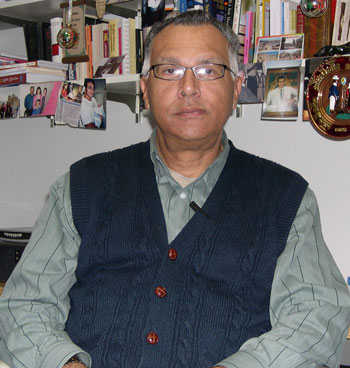Professor's 'History' Gains Him 'Historia' Acceptance
 |
| Spanish professor Rafael Saumell-Munoz's
personal history and his research on Cuba has led to his
acceptance into the exclusive Academia de la Historia
de Cuba (Exilio). |
As someone who has experienced life under Fidel Castro’s
dictatorship first-hand, SHSU Spanish professor Rafael Saumell-Muñoz
has had a lot to say on the subject throughout the years.
His first collection of unpublished, “politically incorrect”
short stories led to a five-year imprisonment in Cuba in 1981.
Since then, he has written a number of articles, papers and
books on Cuban literature, prison narratives and the histories
of human rights and the prison system in Cuba.
These scholarly contributions recently earned him unanimous
election into the Academia de la Historia de Cuba (Exilio),
an exclusive scholarly organization dedicated to telling its
version of Cuban history.
“The people who join this academia, or academy, are
people who through their work will show some discrepancy with
the official version of the history of Cuba that is told now
through the schools,” Saumell-Muñoz said. “The
Cuban government also controls the educational process, and
they make sure to teach the students from a particular angle
that they prefer.”
Most of these people are “dissidents,” people
who have been exiled (hence “Exilio”) for similar
criticisms of the Cuban government or simply do not accept
the government’s version, Saumell-Muñoz said.
“This is an organization created by Cuban scholars and
intellectuals living abroad who are dissident, who are opposed
to the Cuban government,” he said. “The publishing
industry in Cuba is state-owned, so they would never publish
a book that goes against them. They would never give you any
public space to write a paper or essay that would question
the government policies on any subject.”
An award-winning TV writer and producer while living in Cuba
in the 70s, a “so-called friend” of Saumell-Muñoz,
whom he later found out was a secret police informant, told
the police about Saumell-Muñoz’s “politically
incorrect” collection of short stories.
“The police arrested me and asked two so-called readers
of the Union of Writers and Artists of Cuba to make a political
evaluation of the book,” he said. “These two readers
came to the conclusion that my book was counterrevolutionary.”
Labeled “enemy propaganda” by the Cuban penal
code, Saumell-Muñoz was sentenced to five years in
prison.
“I knew that it was a criticism of the present situation
of Cuba at the time, but it would never cross my mind that
it would be considered enemy propaganda for two reasons: in
order to consider something propaganda, it has to be public,
but if a book has not been published, how can you call it
public?” he said. “If you label something enemy
propaganda, that document must be paid for by a foreign government
who wants to use the document to attack another government.
Obviously I wasn’t paid by anyone; I was just moved
by my consciousness.
“They control the police, they control the courts, they
control the prison system. So any time you have political
trouble in Cuba, this is a lost battle,” Saumell-Muñoz
said. “They will do to you whatever they want.”
When he was released in 1986, he applied for an American visa,
which was granted in 1988, and eventually became a graduate
student at Washington University in St. Louis, Mo., where
he completed his doctorate.
He came to SHSU in 1992.
In May, Saumell-Muñoz will travel to Miami, Fla., the
academy’s headquarters, to read his paper on the Cuban
19th Century poet José María Heredia as his
formal acceptance to the group’s invitation.
His memoirs will be published in Spain later this year.
—END—
SHSU Media Contact: Jennifer
Gauntt
Jan. 25, 2008
Please send comments, corrections, news tips to Today@Sam.edu.
|








